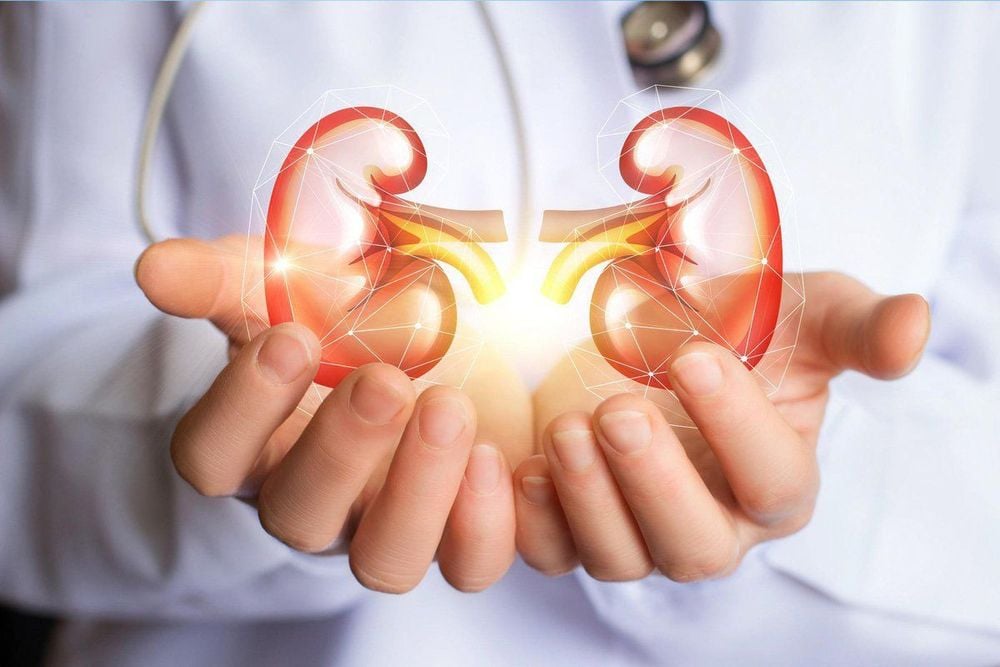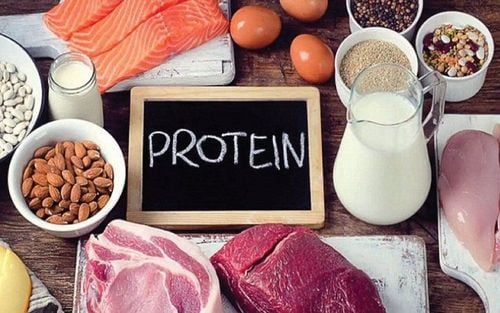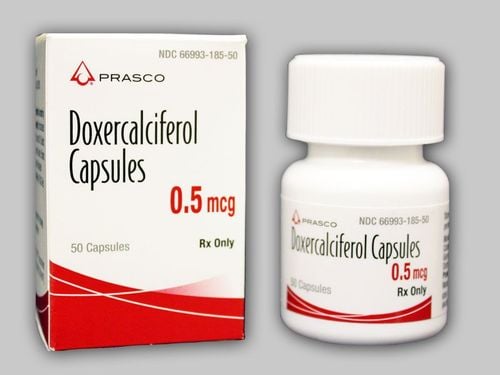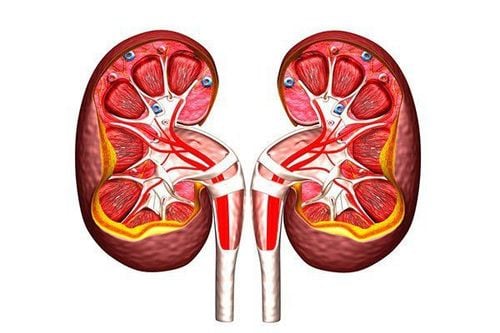This is an automatically translated article.
There are many risk factors for kidney disease. The most common are uncontrolled diabetes and high blood pressure. When the kidneys can't function properly, fluid can build up in the body and waste can build up in the blood. To reduce the buildup of waste products in the blood, improve kidney function and prevent further damage, certain foods should be avoided or limited in the diet.
1. Why is an eating plan important for kidney disease?
The kidney is a bean-shaped organ that performs many important functions such as: responsible for filtering the blood, removing waste through the urine, producing hormones, balancing minerals and maintaining the balance of other substances in the body. body. When the kidneys have problems, these fluids can accumulate in the blood, affecting kidney function.To limit the risk of affecting the kidneys, it is possible to develop a reasonable diet for these cases. Because, what you eat and drink affects your health. Staying at a healthy weight and eating a balanced diet that's low in salt and fat can help you control your blood pressure. If you have diabetes, you can control your blood sugar by choosing carefully what you eat and drink. Controlling high blood pressure and diabetes can help prevent kidney disease from getting worse. A kidney-friendly diet can also help protect your kidneys from further damage. So, what should kidney patients eat? The right kidney disease diet will limit certain foods to prevent the minerals in those foods from accumulating in your body.

Một chế độ ăn uống thân thiện với thận cũng có thể giúp bảo vệ thận của bạn khỏi bị tổn thương thêm
Dietary restrictions vary depending on the stage of kidney disease. For example, people in the early stages of chronic kidney disease will have a different diet than people with end-stage renal disease, or kidney failure. What can people with kidney failure eat? End-stage renal disease patients requiring dialysis will also have different dietary restrictions. Treatment of kidney disease through dialysis to remove excess water and filter waste. Most people with end-stage kidney disease will need to follow a kidney-friendly diet to reduce the build-up of certain chemicals or nutrients in the blood.
In the case of chronic kidney disease, the kidneys cannot remove enough excess sodium, potassium or phosphorus. As a result, these people are at higher risk of having elevated blood levels of these minerals.
So, what should people with kidney disease eat? A sensible diet for kidney disease typically includes limiting sodium and potassium to 2,000 mg per day and limiting phosphorus to 800-1,000 mg per day.
Protein metabolism along with the process of filtering waste products in protein metabolism will be difficult when the kidneys are damaged. Therefore, people with CKD stages 1-4 may need to limit the amount of protein in their diet. However, people with end-stage kidney disease who are on dialysis have an increased need for protein.
2. Some dietary tips for kidney disease
If your kidneys are not working as they should, your doctor can develop an eating plan with a specific daily amount of protein, sodium and potassium. Checking these nutrients can help prevent kidney disease from getting worse.
If you have kidney disease, or you are facing the question: what to eat and what to avoid with kidney stones? You need to see a nutritionist for guidance on building a reasonable diet and managing your current medical condition.
To respond to a kidney disease diet, with all meal plans, including a kidney-healthy diet, you need to monitor how much of certain nutrients you take in, such as:
Calories Protein Fat Carbohydrates

Xây dựng một kế hoạch ăn uống với lượng protein thích hợp cho người bệnh thận
2.1. Calories Your body gets energy from the calories you eat and drink. Protein, carbohydrates and fats in the diet provide calories for the body. Calorie content depends on your age, gender, body size, and activity level.
You may also need to adjust your calorie intake based on your weight goal. Some people will need to limit the amount of calories they eat. Others may need more calories. Your doctor or dietitian can help you figure out how many calories you should be consuming each day.
2.2. Protein Protein is responsible for building, repairing and maintaining all cellular functions in the body and can be used for energy if needed. When the kidneys are not functioning properly, they cannot process as much protein. It is very important that you eat enough carbohydrates and fats to give your body all the energy it needs. The limited amount of protein you eat will then be used to build and repair your cells. Your new eating plan will need to include the right balance of protein, carbohydrates, and fats. Main sources of protein include meat, poultry, fish, eggs, milk, beans and nuts. Some other foods also contain protein but in lower amounts such as: breads, cereals, seeds and vegetables...
2.3. Fat You need some fat in your meals to stay healthy. Fats give you energy and help you use some of the vitamins in your food. But too much fat can lead to weight gain and heart-related diseases.
Unsaturated fats, including:
Olive oil Peanut oil Corn oil Unsaturated fats can lower blood cholesterol. If you need to gain weight, try to eat more unsaturated fats. If you need to lose weight, limit unsaturated fats in your meals.

Chất béo như dầu ô liu không bão hòa có thể làm giảm cholesterol trong máu
Saturated fats can raise cholesterol levels as well as increase the risk of heart-related diseases. Saturated fats include:
Butter Fat shortening Meats Limit these in your meal plan. Instead, choose healthier, unsaturated fats. Cutting fat from meat and removing the skin of chicken or turkey can also help limit saturated fat. You should also avoid trans fats. This type of fat makes your "bad" cholesterol (LDL) higher and your "good" cholesterol (HDL) lower. When this happens, you are more likely to develop heart disease, and cause kidney damage.
2.4. Carbohydrates Healthy sources of carbohydrates include fruits and vegetables. Unhealthy sources of carbohydrates include: sugar, honey, hard candy, soft drinks and other sugary drinks. Some carbohydrates are high in potassium and phosphorus, which you may need to limit depending on the stage of your kidney disease.
2.5. Sodium Sodium can increase your blood pressure and cause you to retain water. For people with kidney disease, excess sodium and fluid can build up in the body, which can affect your heart and lungs. Your new eating plan may include a daily sodium limit. A dietitian will develop the best nutrition plan to stay within these limits. Sodium is found in salt and most processed foods. So when choosing foods, be sure to check the nutrition facts label for the sodium content of the food. Also check the labels of salt substitutes before using them; Many contain potassium which may also need to be limited.
2.6. Potassium Like sodium, potassium must be balanced in the body. If your kidneys are not working well, your blood potassium levels can increase. High potassium levels affect your heart rate, so your new eating plan may include limiting potassium. Nutritionists will explain how to maintain your limits. Potassium is found in many fruits and vegetables, beans, nuts, and dairy foods.

Lượng Kali trong khẩu phần ăn của người bệnh thận cần duy trì trong giới hạn
Currently, Vinmec International General Hospital offers customers a variety of health checkup programs such as:
Standard general health checkup package VIP general health checkup package General health checkup package Especially With these packages, customers will receive a comprehensive health check, especially kidney function, assessment of glomerular filtration function, helping to classify kidney failure. Early diagnosis of renal dysfunction ranging from mild to moderate through quantitative tests of creatinine, urea, and estimated glomerular filtration rate. The examination process is carried out by reputable, experienced and highly qualified doctors. After the results are available, the patient will be analyzed by the doctor, advised on the results and appropriate treatment.
If you have a need for a general health examination or treatment of kidney-related diseases at Vinmec, please book an appointment directly at the website or contact the hotline for detailed advice.
Please dial HOTLINE for more information or register for an appointment HERE. Download MyVinmec app to make appointments faster and to manage your bookings easily.
Reference source: eatright.org












